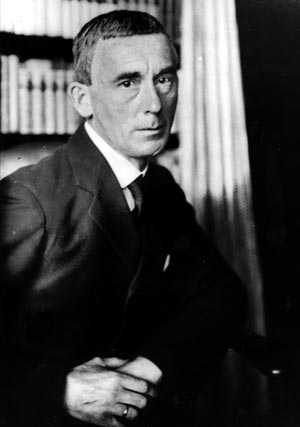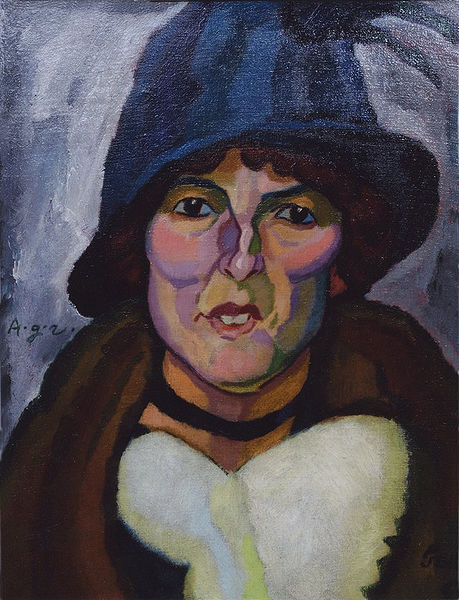<Back to Index>
- Writer Hugo Ball, 1886
- Performer and Poet Emmy Hennings, 1885
PAGE SPONSOR

Hugo Ball (February 22, 1886 – September 14, 1927) was a German author, poet and one of the leading Dada artists.
Hugo Ball was born in Pirmasens, Germany, and was raised in a middle class Catholic family. He studied sociology and philosophy at the universities of Munich and Heidelberg (1906 – 1907). In 1910, he moved to Berlin in order to become an actor and collaborated with Max Reinhardt. At the beginning of the First World War he tried joining the army as a volunteer, but was denied enlistment for medical issues. After witnessing the invasion of Belgium, he was disillusioned saying: "The war is founded on a glaring mistake, men have been confused with machines". Considered a traitor in his country, he crossed the frontier with his wife and settled in Zürich. Here, Ball continued his interest in anarchism, and in Bakunin in particular; he also worked on the book of Bakunin translations, which never got published. Although interested in anarchist philosophy, he nonetheless rejected it for its militant aspects, and viewed it as only a means to his personal goal of enlightenment.
In 1916, Hugo Ball created the Dada Manifesto, making a political statement about his views on the terrible state of society and acknowledging his dislike for philosophies in the past claiming to possess the ultimate Truth. The same year as the Manifesto, in 1916, Ball wrote his poem "Karawane," which is a German poem consisting of nonsensical words. The meaning however resides in its meaninglessness, reflecting the chief principle behind Dadaism. Some of his other best known works include the poem collection 7 schizophrene Sonette, the drama Die Nase des Michelangelo, a memoir of the Zürich period Flight Out of Time: A Dada Diary, and a biography of Hermann Hesse, entitled Hermann Hesse. Sein Leben und sein Werk (1927).
As co-founder of the Cabaret Voltaire in Zürich, he led the Dada movement in Zürich, and is one of the people credited with naming the movement "Dada", by allegedly choosing the word at random from a dictionary. He was married to Emmy Hennings, another member of Dada.
His involvement with the Dada movement lasted approximately two years. He then worked for a short period as a journalist, for Freie Zeitung in Bern. After returning to Catholicism in July 1920, Ball retired to the canton of Ticino where he lived a religious and relatively poor life. He died on Sant'Abbondio, Switzerland.
His poem "Gadji beri bimba" was later adapted to the song "I Zimbra" on the 1979 Talking Heads album Fear of Music; he received a writing credit for the song on the track listing.
A voice - cut - up collage of his poem "Karawane" by German artist Kommissar Hjuler, member of Boris Lurie's NO!Art Movement, was released as LP at Greek label Shamanic Trance in 2010.

Emmy Hennings (17 February 1885 – 10 August 1948) was a performer and poet. She was also the wife of celebrated Dadaist Hugo Ball. Despite her own achievements, it is difficult to come by information in English about Hennings that is not directly related to her relationship with Hugo Ball. Several biographies of Hennings have been published in German.
Hennings was born in Flensburg, Germany. She was a performer at the Cabaret Simplizissimus in Munich, when she met Ball in 1913. At the time, Hennings was already a published poet, whose works had appeared in left wing publications called Pan and Die Aktion. In 1913 she also published a short poetry collection called Ether Poems, or Äthergedichte in German. Later, Hennings was a collaborator to the magazine Revolution, which was founded by Ball and Hans Leybold.
Hennings and Ball moved to Zurich in 1915, where they took part in the founding of the Cabaret Voltaire, which marked the beginning of the Dada movement. Hennings was a regular performer at the Cabaret Voltaire. Her performances included a role in Das Leben des Menschen (the Life of a Man), in which she appeared with Ball. This was the German premiere of the play by Leonid Andreev. Hennings also performed in a piece written by Ball, called Krippenspiel. After the Cabaret Voltaire ended, Hennings and Ball toured, performing mostly in hotels. Hennings sang, did puppetry, and danced to music composed by Ball. She also recited her own poetry. In 1916 Ball and Hennings created Arabella, their own ensemble troupe, where Hennings performed under the name Dagny. Hennings married Ball on 21 February 1920. Although they had no children together, Hennings had a daughter, Annemarie, from a previous relationship. Hennings, who outlived Ball by two decades, lived in Magliaso, Switzerland, from 1942 to 1948. She died at a clinic in Lugano - Sorengo, Switzerland.
In The Magic Bishop: Hugo Ball, Dada Poet, author Erdmute Wenzel White writes that Hennings “was admired by expressionists as the incarnation of the cabaret artist of her time... The shining star of the Voltaire, according to the Zuricher Post (Zurich Post), her role in Dada has not been adequately acknowledged.”
White also cites a poem by Johannes Becher which he uses as evidence that Emmy served as a muse for other artists of the time: "It was in Munich, at the Café Stefanie, Where I recited for you, Emmy, poems That I dared tell only you".
The following poem is an example of Hennings' poetry:
Tänzerin
Dir ist als ob ich schon gezeichnet wäre
Und auf der Totenliste stünde.
Es hält mich ab von mancher Sünde.
Wie langsam ich am Leben zehre.
Und ängstlich sind oft meine Schritte,
Mein Herz hat einen kranken Schlag
Und schwächer wird's mit jedem Tag.
Ein Todesengel steht in meines Zimmers Mitte.
Doch tanz ich bis zur Atemnot.
Bald werde ich im Grabe liegen
Und niemand wird sich an mich schmiegen.
Ach, küssen will ich bis zum Tod.
Dancer
To you it's as if I was already
Marked and waiting on Death's list.
It keeps me safe from many sins.
How slowly life drains out of me.
My steps are often steeped in gloom,
My heart beats in a sickly way
And it gets weaker every day.
A death angel stands in the middle of my room.
Yet I dance till I'm out of breath.
Soon lying in the grave I'll be
And no one will snuggle up to me.
Oh, give me kisses up till death.